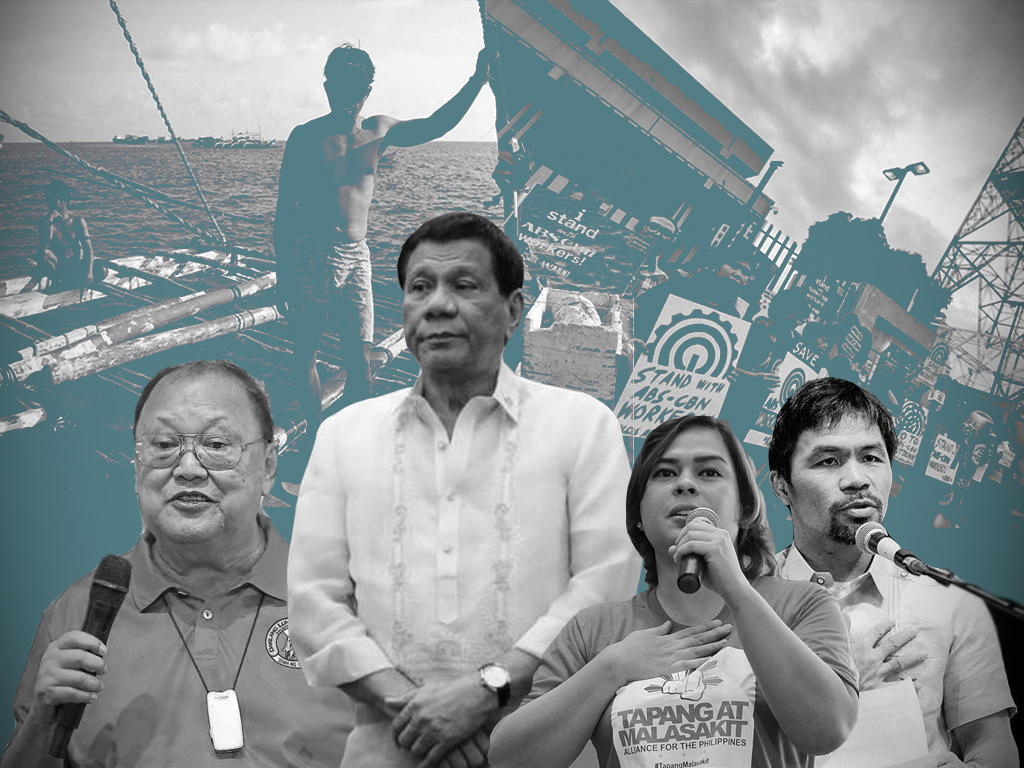This Week in Media (July 12 to 16, 2021)
Campaigning early tops news agenda; ABS-CBN closure marks one year; PH Hague arbitral ruling hailed at 5th
DESPITE A clearly defined campaign period, Filipino politicians probably enjoy one of the longest campaign periods in the world. Without clearly set primaries and caucuses which help track the progressive build-up of a candidate’s bid for public office, politicians feel free to promote themselves through all kinds of “electioneering” activities, with the cooperation of much of the media.
The pandemic has not dampened this political penchant, with at least three candidates throwing their hats into the ring for the presidency. The news has followed every suggestion of some political figures’ availability for the Senate, heating up a contest that has yet to officially begin. Notably, the president has announced his availability for VP.
The media have gone with the flow, fixated on the conversation initiated by the Duterte father and daughter, and the exchange between the feuding factions in the PDP-Laban, which supported Rodrigo Duterte’s run for the presidency in late 2015. With the deadline for the filing of certificates of candidacy (COC) a full three months away, media seem to have bought into the administration strategy to use media coverage to keep Duterte, his family and his cronies in power.
No news organization has dared flip the focus of news on the public, on sectoral groups, or on the civic organizations that have begun to engage their communities in the issues of registration and voter education despite the fact that it is the voters who decide the outcome of elections.
CMFR checked the coverage and found the media sharpening the incumbent’s natural advantage, focusing mostly on the Dutertes and their political allies. (See: “Premature campaigning via media: Spotlight on incumbents gives them pre-campaign boost“)
Meanwhile, two milestones marked the challenges that continue to plague the nation.
Five years ago, a triumph for Philippine claim
Media observed on July 12 the fifth anniversary of the UN arbitration tribunal ruling that invalidated China’s claim on Philippine waters. Coverage relied mainly on the statements of officials, including Harry Roque, Vice President Leni Robredo, and others involved in the filing of the case that the administration of President Benigno Aquino III pursued and won.
Media noted different perspectives, including the view of maritime expert Prof. Jay Batongbacal of the University of the Philippines that Duterte has taken a conciliatory position regarding China. Reports in CNN Philippines, Inquirer, ABS-CBN online reported the complaints of fisherfolk that they still cannot fish in the vicinity of Scarborough Shoal and other areas within the exclusive economic zone (EEZ) where the Chinese are in control.
Not surprisingly, Rodrigo Duterte kept quiet, but curiously, China broke its silence, serving as a kind of proxy for his voice — or was it the other way around? Reports quoted Beijing as dismissing the ruling as a “a piece of waste paper” – the same message that Duterte has said often enough. News reports, however, refrained from pointing this out, merely echoing Roque’s reaction that Beijing’s reaction was “not surprising” and that the ruling was already part of international law.
The Duterte administration did not undertake any efforts to rally the support of the international community for the country’s position on the West Philippine Sea. Duterte’s pivot to China has been mostly an unabashed submission to Beijing and hostile moves to control Philippine waters. Media missed this context in reporting the presidential spokesperson’s lame insistence that “(we) have done everything (we) could” on the issue. Reporters did not even ask him what these efforts were.
One year after the closure of ABS-CBN
Media organizations did much less in noting the first anniversary of the closure of the country’s giant network that has reverberated all over the world. The failure of a congressional committee to renew the franchise of ABS-CBN was clearly directed by the Palace, as the president himself had claimed in the aftermath that he had successfully struck down the “oligarchic” owners of the network. Even last year, the media could not muster enough solidarity to report the closure as an attack against press freedom in violation of the Constitution.
Along with reports carried by the daily news program, TV Patrol, ABS-CBN dedicated a whole webpage for it titled “Death of a franchise,” which featured stories on ABS-CBN’s losses in human resources and finances, the way the network coped with the closure, the representatives who voted in their favor and the continuous refusal of the House to officially disclose the names of those who had rejected the franchise renewal.
But the cause did not capture the attention of other news organizations, speaking volumes about the lack of institutional solidarity that plagues the press community.
The only stories were from Bulatlat, Rappler, Philstar.com recalling the mass layoffs and support of ordinary citizens for ABS-CBN a year ago. Star reported on House proposals to renew the franchise, while John Nery in his column in the Inquirer argued how the closure of the ABS-CBN should be a campaign issue.
Duterte-Duterte in Pulse Asia survey
Pulse Asia reported that in a survey of 2,400 respondents conducted from June 7 to 16, 28% preferred Sara Duterte-Carpio as preferred presidential candidate, while 18% preferred her father Rodrigo as vice president.
Coverage did not include the views of those who question the validity of poll findings given the current conditions: limits to information access, massive political propaganda for the government and the culture of fear which restrain the more forthright responses that may appear critical of government. There was no mention either of the decision of the other polling organization, Social Weather Stations (SWS) to suspend polling on approval or trust ratings given these conditions.
Illegal jabs for public official on the vaccine front
Media carried the announcement on July 12 by San Juan Rep. Ronaldo Zamora, who in a public forum said that he had received four shots of the COVID-19 vaccine: two Sinopharm jabs in December 2020, and 2 Pfizer shots this year as boosters. There is still no data on the use of booster shots and the efficacy of the use of different brands for one person.
Typically, no government authority said anything to point out the illegal actions of Zamora. The Health secretary was in the same forum but reports said he made no public statement. Health Usec. Rosario Vergeire said the DOH was not informed of Zamora’s case.
The admission raises many questions about vaccine distribution, particularly Sinopharm’s, the use of which in December was still illegal in the country. DOH also said the administering healthcare worker may also be liable for inoculating a “bootleg” vaccine, but media did not prod the recipient for his accountability.
Only Interaksyon reported on the calls for accountability: “Why blame health workers?’ Calls for accountability as San Juan City solon admits getting 4 shots of COVID-19 jabs,” another example of how much of the media in the name of “objectivity” fail to fulfill their role as the watchdog of power.
Again, the media had let pass another case of an administration politician’s immunity from the law.




Leave a Reply